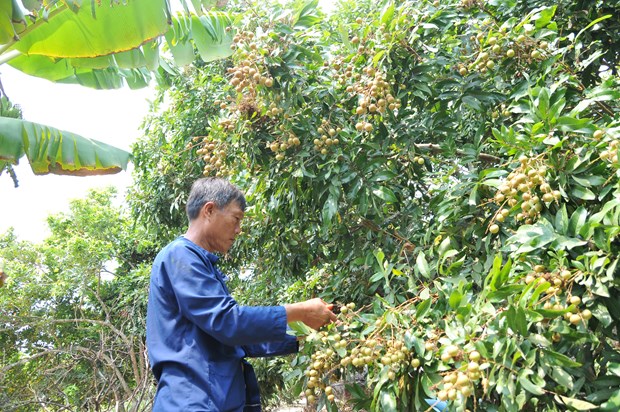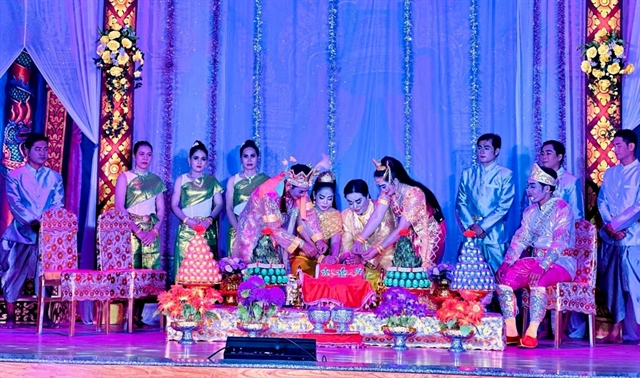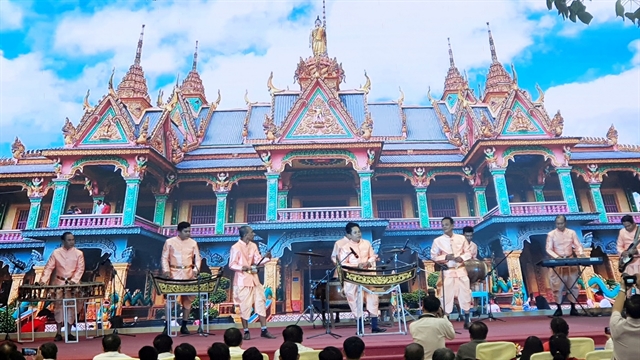 Society
Society

 |
| KHMER ART: The Khmer Traditional Art Troupe of Sóc Trăng Province performs the 'dù kê' play 'The Sacred Love' at the 2023 Southern Dù Kê Theatre Festival. Photo courtesy of the troupe |
The Khmer Art Troupe of Sóc Trăng Province is contributing to preserving and promoting the ethnic Khmer culture.
The troupe is one of the biggest performing arts groups in the Mekong Delta, performing traditional art forms of the Khmer people such as dù kê (a unique style of the Khmer musical theatre), rô băm (a classical dance-drama of the Khmer’s royal stage), and folk dance and music.
In 2023, the group offered more than 32 performances at major Khmer festivals such as Chol Chnam Thmay and Sen Dolta, and cultural exchange meetings with art troupes from India and Cambodia.
All the performances attracted more than 6,000 spectators.
The troupe also gave 48 free shows for 48,000 people in Khmer minority neighbourhoods in the province.
Among the show's repertoire is the dù kê play Hoa Cau Tình Thắm (The Sacred Love) written by Đa Ra and Sô Kha Phép and directed by Meritorious Artist Trần Hoàng Đông of the troupe.
The work sends a message of love for country and family, loyalty and courage, and earned the troupe a silver medal at the 2023 Southern Dù Kê Theatre Festival in Trà Vinh Province.
Dù kê was created by the ethnic Khmer in the early 1920s. In the art, artists in traditional costumes perform plays based on the religions, traditional customs and culture of the Khmer, poetry based on Indian epics such as the Ramayana and the Mahabharata, and even today’s social issues.
The art genre was recognised as a national intangible cultural heritage by the Ministry of Culture, Sports and Tourism in 2014.
Danh Vy Ra of Mỹ Xuyên District’s Thạnh Quới Commune says he and his neighbours like Khmer art a lot.
“We are always excited about the Khmer Traditional Art Troupe's performances in our commune. Their shows often publicise policies and guidelines relating to ethnic solidarity that are easy to understand,” he adds.
 |
| CULTURAL EXCHANGE: The troupe presents Khmer music and dance at a cultural exchange meeting with the Qawwali group from India. Photo courtesy of the troupe |
In addition, the troupe worked with Việt Nam Television, and Sóc Trăng Television to make and broadcast videos about the Khmer people’s traditional dramas, music and dance to promote their culture to audiences nationwide.
“Thanks to the support and guidance from the provincial Department of Culture, Sports and Tourism, the Khmer Traditional Art Troupe completed its plans and missions in 2023," Lưu Thanh Hùng, head of the troupe, says.
"All the troupe's performances not only satisfied the cultural enjoyment needs of people in Sóc Trăng and neighbouring provinces but also contributed to promulgating the State's policies and guidelines to the people in an easy-to-understand way.”
He adds that in the future, the troupe would continue to cooperate with the culture department and relevant agencies to develop a project to preserve and promote dù kê as well as the cultural value of ethnic minority groups to boost tourism.
The troupe will also implement a plan to introduce pinpeat, or the largest Khmer traditional musical ensemble, to perform ceremonial music at temples, and rom vong, the Khmer people’s most popular folk dance.
The plan will focus on offering a training course for students in the province and other localities, and increase the number of performances of these performing arts to the public.
Last October, the Khmer Traditional Art Troupe provided a two-month training course on folk music and dance for 92 young artists and art students.
It also hosted a performance of pinpeat ensemble and rom vong dance at the Sóc Trăng Museum to introduce these arts to local people.
“Through these performances, traditional arts will come closer to the public and help them know more about the unique performing arts of the Khmer people,” Hùng says. VNS




